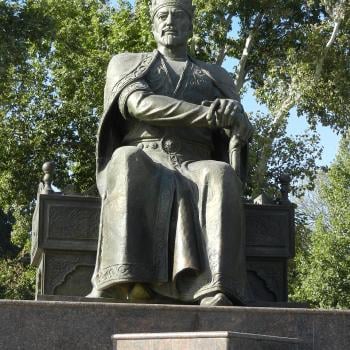We are now living in the middle of this transformation of Judaism, and it is therefore very difficult to know where in the process we stand. But it is clear that 1967 was the pivotal point in the process. The symposium was conducted in the summer of 1966. The following summer, the summer of the Six-Day War, everything changed. The very name "Six-Day War" (provided by General Moshe Dayan) was coined to evoke the biblical six days of creation. A new world was being created -- not only in the geopolitical sense, but also in the ideological, mythic, and religious senses. Yes, the balance of power in the Middle East changed, as did the configuration of the U.S.-Soviet power struggle. But in terms of the history of religious ideas, the war's most unexpected consequence was to hasten the transformation of the Jewish religion from a text-based tradition of creative speculation to one of unshakeable certainty -- not in chosenness or revelation but in the sanctity and centrality of Israel, the modern state.
Today, forty-four years after that war, Israel is at the center of Jewish religious life. That concern about the State has been at the center of Jewish communal life has long been accepted -- a development that pleases many and dismays others. But now the centrality of Israel is at the core of Jewish religious life. As a prominent rabbi told me recently, "In next week's sermon I could question God's actions in today's world and no one would bat an eyelash. If I were to question the State of Israel's actions I might not get out of the synagogue alive. At the very least I would lose my pulpit."
My conversation partner was a Conservative Rabbi, but he could just as well have been a Reform or Modern Orthodox Rabbi.
How did this transformation come about? Not through some mysterious inevitable historical process, but through the intentions and actions of some very charismatic leaders. Through their influence, the "creation" (again, note the biblical word) of Israel and the "unification" of its "eternal, undivided capital," Jerusalem, have moved from the periphery of Judaism to its center.
If the State of Israel was the Messiah, David ben Gurion was its prophetic figure. But like Marx, Freud, and other modern prophets of Jewish descent, he prophesied the end of religion as we know it. In the late 1950s, Ben Gurion articulated his notion of "Israelism." In keeping with the assertively secular ideology of the most influential Zionist thinkers, Ben Gurion anticipated that Israel-the-place would replace Judaism-the-religion as the focus of Jewish life. Diaspora Jewry -- and here Ben Gurion's remarks were addressed directly to the Jews of the United States -- had to concede pride of place and influence to Israel. Jewish religious practice, which he and his fellow secularists considered an impediment to authentic national development, would be superseded by Zionism's achievement -- the State. The core rabbinic text, the Talmud, would be replaced by a return to the Bible -- a book long neglected by the rabbis in favor of the classical rabbinic texts.
On May 14th, 1948, after signing the meggilat ha-atzmaaut or Declaration of Independence, the new Prime Minister was asked by his advisor on religious affairs, Rabbi Meir Berlin (Bar Ilan), to visit Tel Aviv's Great Synagogue to offer a prayer of thanksgiving. He told the rabbi that that year, 1948, marked the 39th year he had been in Palestine, and up to that day he hadn't yet been in a synagogue. But for this momentous occasion, he would make an exception. Ben Gurion was a remarkable visionary, but I don't think he could have imagined that within thirty years after his death in 1973 virtually every modern synagogue in the world would display an Israeli flag, that the singing of Hatikvah would take on liturgical significance, and that Yom Kippur services in many a liberal synagogue would open with a blessing or invocation by a representative of the Israeli government -- ideally an army general -- and if one wasn't available, then an ambassador or other consular official. But on other questions regarding religion in Israel Ben Gurion was wrong, particularly about Orthodox Judaism in Israel. Not only did it not disappear, it was immeasurably strengthened, and that produced the Settler Movement and the Haredim.
In the face of the return of the biblical and the messianic, the challenge for the future of Judaism is how to think about Israel in a rational considered fashion, a fashion not influenced by the supernatural and the messianic.
Shalom Goldman is professor of Hebrew and Middle Eastern studies at Emory University. His new book is Zeal for Zion: Christians, Jews and the Idea of the Promised Land.




